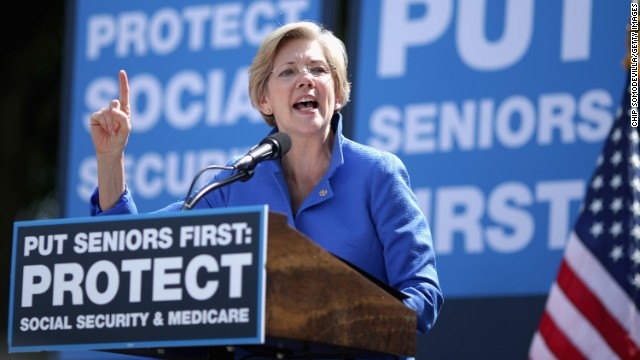Warren’s decision to wholly embrace another candidate’s idea — particularly on an issue of such outsized significance in the 2020 election — has put her in an unfamiliar position of defending and advocating a proposal that is not uniquely hers. And she’s made clear that she has no intention of authoring a comprehensive health care plan of her own during the Democratic primary contest.
Warren has gone to considerable lengths in recent months to demonstrate unwavering support for Medicare for All, in one of the clearest signs of the political alliance forged between Warren and Sanders, even as they jockey for second place behind former Vice President Joe Biden. But there are early signs of the potential risks involved in Warren’s full embrace of Sanders’ signature proposal — she’s opened herself up to the familiar criticism that Medicare for All is too expensive, disruptive and unrealistic.
Those dynamics were on full display at Thursday night’s presidential debate, when she was asked — again — whether Medicare for All would result in tax hikes for the middle class. Not for the first time, Warren pivoted.
Her argument is that in the aggregate, Americans will spend less on health care in a single-payer system, which would eliminate premiums paid to health insurance companies, along with deductibles and copayments. But questions about additional taxes for the middle class are not going away anytime soon, and would ramp up in intensity if Warren were to win the Democratic nomination.
Reassurance for progressives
If Warren is confronting criticism from colleagues to the ideological right of her, the decision to take an unequivocal stance on Medicare for All has also had the effect of reassuring some progressive admirers. In interviews with CNN, activists who vocally back Medicare for All said Warren’s recent “I’m with Bernie” positioning helped assuage concerns about her earlier, more circumspect, tone on Medicare for All.
“I think we get everybody together. And that’s what it is, we’ll decide,” she said. “I’ve also co-sponsored other bills, including expanding Medicaid as another approach that we use.”
Waleed Shahid, communications director for Justice Democrats, the group best known for helping to launch Alexandria Ocasio-Cortez’s successful 2018 campaign for a congressional seat from New York, said Warren’s “I’m with Bernie” comments marked “an incredibly important moment for her campaign.”
“I think many progressives were kind of confused and getting mixed signals from her on Medicare for All,” Shahid said. “That was a big moment for her to come out, pretty full-throated, for what’s in the Bernie and (Washington state Rep. Pramila) Jayapal bills, which is a single-payer system.”
Asked if Warren should roll out her own version of Medicare for All, Shahid argued that such a move might be counterproductive — both for Warren and the single-payer movement.
“I don’t think she needs to put out her own plan or anything like that,” he said. “In fact, putting out her own plan would be seen as competing with the existing bills that people have been rallying around and worked really hard on.”
Michael Lighty, a Medicare for All advocate and former director of public policy for National Nurses United, the first major union to endorse Sanders in 2016, was part of the push to build support in the Senate for the 2017 Medicare for All bill.
That included a sales pitch to Warren’s office, which he said initially viewed it with some skepticism.
“Her staff gave the same consideration to that policy that she does to everything, which is pretty severe scrutiny, really,” said Lighty, who is supporting Sanders again in 2020. Ultimately, though, Warren came around to the legislation, and was in the room next to her colleague from Vermont when it was ultimately unveiled on Capitol Hill.
Still, Lighty said, there’s a nagging question in the back of his mind.
“You have to ask, if Bernie’s not there, what will she do? Because she says, ‘I’m with Bernie,’ and if Bernie is not there, what will she do?” he said. “So I think you have to ask those questions. I don’t think I would consider her commitment and policy approach settled on Medicare for All.”
Another front in the battle
The simmering skepticism among some dedicated Medicare for All activists is also rooted in a less-talked-about health care battle.
Warren, along with fellow Massachusetts Democratic Sen. Ed Markey, pushed as recently as early 2018 for a repeal of the Affordable Care Act’s tax on medical devices, an industry with a hub in the Bay State. The tax, which Republicans often targeted during Obama-era legislative standoffs over the health care law, was meant to help offset some of its new costs.
A Warren aide noted to CNN that her support for repealing the tax has been contingent on lawmakers finding an appropriate source of alternative revenue.
She has since become more vocal in her criticism of big pharmaceutical and insurance companies, railing against their multibillion-dollar profits at a time when millions of Americans can’t foot the bill for life-saving drugs or coverage.
“My observation is that your political philosophical approach to a system failure is generally not to expand the size of the public sector, but to instead heavily regulate private sector actors and beat down their greed,” Barkan said. “Was that the source of your initial hesitation on the question of getting rid of private insurance, or was it something else?”
Warren gently pushed back, saying her concerns had more to do with the “transition than on (the) end point.”
But she then made a point that, for a candidate who so often argues that well-regulated markets can conquer corporate excess, amounted to a notable admission that health care was different.
“There are areas where markets just don’t work, and a big part of health care is one of those,” Warren said. “So the idea that we’d get a couple regulations in place, and it’ll all — it’ll all sort itself out, it’s just not true with health care.”















